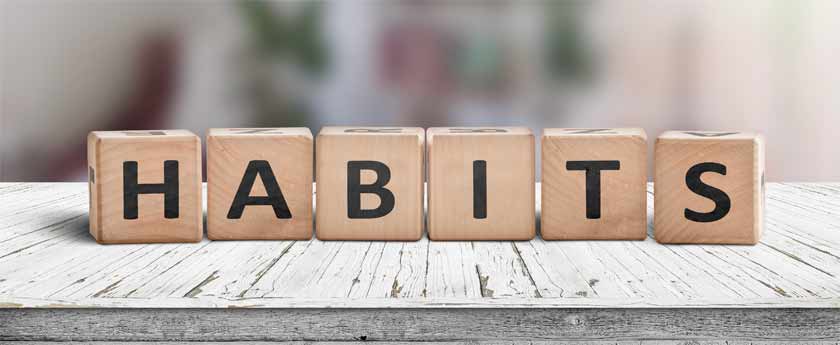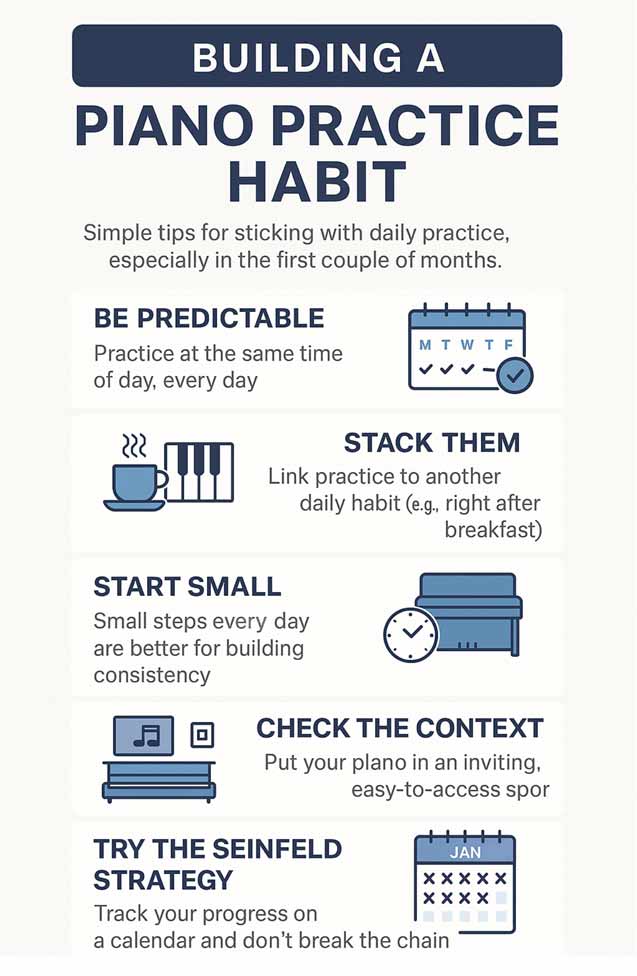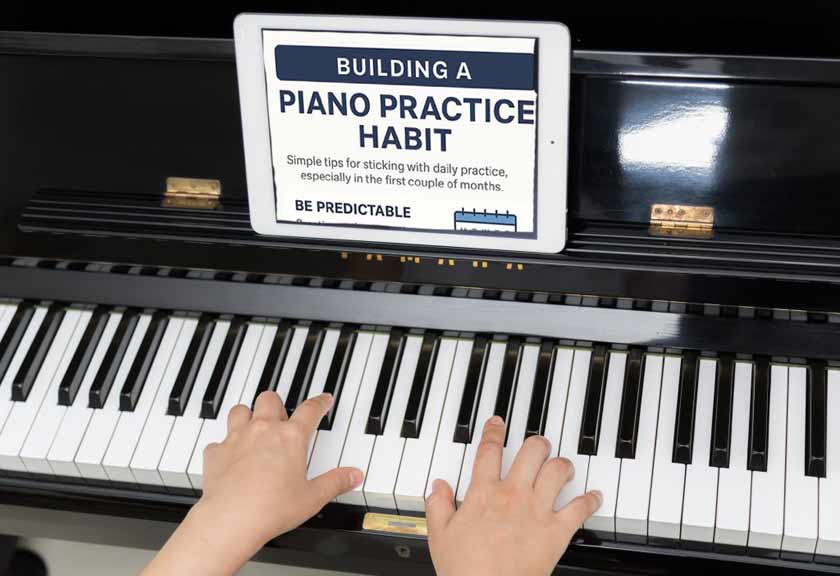The Challenge of a Consistent Piano Practice
Building a piano practice routine that actually sticks can feel harder than playing the instrument itself. Whether you’re just starting out or restarting after a long break, you’ve likely felt that surge of motivation followed by the slow fade into inconsistency. But the key to becoming a regular player isn’t talent or willpower — it’s building habits that work with your brain, not against it.
The Motivation Spike — and the Drop That Follows
We’ve all been there… There’s this thing we really want to learn and we are filled with enthusiasm when we finally have the opportunity to start. And we have all those grand ideas about how much time we are going to set aside for learning and practicing, and we start off strong and right on track, and we even get carried away and may overdo it a bit and… and then something happens and it somehow derails.
If it hasn’t happened to you yet, be warned! If it’s already happening, be hopeful! It’s normal and almost expected. Why? Because finding a regular piano practice rhythm doesn’t have anything to do with some highly praised character trait, like grit or self-discipline, and it doesn’t really depend on how much you want it.

Why Habits Matter More Than Willpower
It depends on habits! And habits take time to become, well… habits. There’s no clear answer for how long they take to set in (and no, they don’t take 21 days to form; that’s just a myth repeated too often). In general, the more different a habit is from your current routines, the more complex it is, and the more infrequently it occurs, the longer it takes.
But let’s have some well-informed expectations here, backed up by some science and some experts: if you make a point of practicing 10-30 minutes a day, every single day, within 2 to 3 months it will feel automatic and kind of effortless, which is exactly what a habit should look like.
The Real Question: How Do You Survive the First Few Months?
So that really only leaves us with one question: what can you do to survive for those 2 or 3 initial months? How can you make yourself stick to it, come rain or shine, until you reach the moment when you don’t have to think about it?
I selected some of my favorite hacks. Let’s have a look!
Be predictable
Or, bore yourself into predictability. And that means: after some experimentation to figure out the best time of the day to practice piano, always do it at that exact moment. Your brain will quickly get the hint. It will start warning you fairly quickly that it’s time to head to the piano bench.
Stack them
Better than going for a specific time of the day is stacking habits, which means associating what you want to become a habit consistently with some other habit you already have on a daily basis.
Examples of possible anchors for your everyday piano practice: after dinner/lunch/breakfast; after walking the dog in the morning; right after you arrive home at the end of the day; first thing you do when you wake up (good luck with that if you’re like me and only start to even know who you are two hours after waking up…); after your morning call to your son;…
Start small and humble
I know, I know… it’s right in the middle of the high enthusiasm! So you’re dreaming of practicing every day for 4 hours… and then some… Take a deep breath! Now’s the moment to be realistic. For the everyday practice you want to establish, commit to a small amount of time, between 10 to 30 minutes. If you feel like it and have the time, you can let yourself go longer later– as many times you wish, for how long you (or your back) can take. But for the core practice moment that you are trying to establish as a habit, you have to keep it so easy to stick with every day that you won’t miss it.
And that’s important because days have a mind of their own, don’t they? You know how it goes “If you want to make God laugh, tell Him your plans”… Or Murphy law “Anything that can go wrong, will go wrong”. So you will need to be prepared for all the things that are going to happen during those 2-3 months and risk ruining your plans. And the best way to prepare for that is to set a very small and manageable goal..
Check the context
This is a no-brainer but probably because it’s so obvious, we just forget about it…
Where exactly is your piano or keyboard? In a place you can see it when you go about your day at home? Or in some basement, attic or room that you never enter? It should be easily seen, tempting you, calling for you, winking at you,… Ok, I got carried away, but I hope the message was clear.
 It should also be easily set to play. If you’ve bought a keyboard and also some cover to protect it from the dust and usually put the bench away at some other place so you won’t stumble over it… it’s time to find a better setup. Let’s face it: we’re all lazy, so it has to be easy! Just sit down and start enjoying yourself.
It should also be easily set to play. If you’ve bought a keyboard and also some cover to protect it from the dust and usually put the bench away at some other place so you won’t stumble over it… it’s time to find a better setup. Let’s face it: we’re all lazy, so it has to be easy! Just sit down and start enjoying yourself.
Also, experiment a bit and be prepared to do any changes that might be needed. For example, you’ve set everything up in the living room where the TV set also has its place. Time to practice today but… ooops it’s some match day and your partner/kid/parent is watching. So, maybe move the piano somewhere else, where you can better control when and how long you practice?
The Seinfeld strategy
We all get this idea that people who are really good at what they do have this mysterious talent that gets it done for them. But the fact is they got to where they are not because of another mysterious personality trait but because they work hard at it. And that’s another way of saying that they found a way of creating habits that serve their purposes.
Once someone asked Seinfeld about how he managed to be so good and productive as a comedian and about his working habits. And he mentioned that, from the very beginning, he had a goal of writing at least one good joke every single day, and in order to get himself to keep doing it he had a calendar where he would mark the days he did it with an X. After a while he noticed that he really resisted breaking the chain; all those X’s right in front of his eyes made it very compelling to keep going, maintain consistency and avoid procrastination.
So I suggest you get yourself a calendar and go for a visually compelling streak of your piano practice days.
An X a day keeps your progress in play!
The risk of the other side of the coin
Whether you choose to get yourself this visual reminder to keep a daily practice or you just keep mental tabs on your consistency, beware of the risk of skipping one day. The quite universal human reaction to this goes according to common knowledge: “In for a penny, in for a pound”.
Your brain is hardwired to stop wasting energy on something that – in the brain’s terms – is not working. So you have this goal of, let’s say, practicing every day, and then there comes tumbling down one of those days when nothing works and you feel like a fireman on call. The next day, or maybe only after several days in a row, your brain marks “piano daily practice” as something to be dropped – it didn’t happen and the energy is needed somewhere else.
Every single person who has tried to get on a diet knows this discouraging effect: one day off track and there goes the diet.
So what can you do to counteract it? First of all, just knowing this will be your initial reaction can help you fight it and that’s a big deal. Then one cool trick is to always have a predetermined margin of error. Let’s say your goal is to practice every day. In this case your rule could be: I will practice every day and allow myself to have a day off every week whenever I need or so choose. This simple buffer will help you counteract the all-or-nothing bias.
A cheat sheet in case you find it useful
 Needless to say, you can use these tricks and hacks in everything else in your life that requires a habit to set in. And remember: when you struggle with something you wish to change in your life or yourself it’s not some sort of personal failure – it’s just a new habit that requires you to find a way of helping it to stick.
Needless to say, you can use these tricks and hacks in everything else in your life that requires a habit to set in. And remember: when you struggle with something you wish to change in your life or yourself it’s not some sort of personal failure – it’s just a new habit that requires you to find a way of helping it to stick.
Want a practice routine that actually fits your lifestyle? I highly recommend starting with a flexible course like Piano for All — it’s what helped me keep going through those early weeks. Try it out, and experiment with these hacks and see how your habit grows.
And why not share about your personal tips and tricks that help you stick to a routine even on those days that look a bit too much like “Murphy days”? Your thoughts and experience are welcome at the comments section.
Ready to lock in a habit? Follow our Learn Piano Online step-by-step path.



